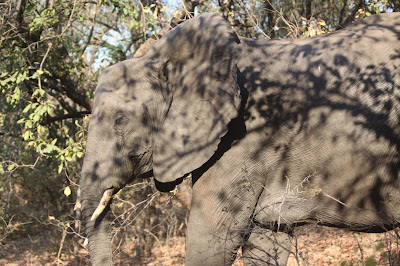While elephants are in serious decline as a species some African parks have a different kind of trouble - over population. In Majete the elephant population has doubled since elephants were re-introduced to the park 10 year ago. Part of the research I helped with looks at population size and damage to vegetation to help assess what would be a healthy sized population of herbivores. Since the park is fenced and surrounded by poverty stricken communities there is no where for the elephants to migrate. Population control will be necessary at some point. There are hopes for a viable elephant birth control to help keep the population size reasonable without the trauma of capturing and moving herds or culling.
I saw elephants probably every day I was in Majete. The matriarchs had all been relocated from other areas into Majete but there are plenty of younger elephants who have grown up in the park.
At least one of the elephants is known to have killed a human and many of them come from areas where they were hunted. But elephants are smart and they are becoming accustomed to tourist who want to take pictures. Not all of them, but some [the "man killer" for example, will charge stopped vehicles, one can only image what sorts of trauma she experienced before coming to Majete, what former friends and family members she is thinking of when she charges].
Some herds are quite willing to let the tourists get close. This elephant, Toothless (she doesn't have tusks, a rarity for African elephants), is an easy to identify member of one of those herds. Her group let us park and watch them for a good long time without getting alarmed.
Their youngest baby entertained us for quite a while playing in a mud puddle. She would throw herself down into the mud (sometimes face first) and roll around, get back up and do it again.
This same herd came through camp one day. We didn't know at the time which group it was - the researchers were in their own tents while us volunteers where in the research lapa.
The lapa is the structure in the back - it's an open sided tent with desks and tables where we would eat our meals and work on computers. The kitchen is in the front. It's got somewhat solid walls and we were told to go there if there was ever a lion or leopard in camp. We, the volunteers, decided that with elephants in the camp we were too exposed in the lapa and we went into the kitchen where we were quiet little mice. Very excited quiet little mice but quiet anyway. The elephants came around all sides of the kitchen, within just a few feet.
Fortunately the herd was a friendly herd so we probably could have stayed in the lapa and been fine.
Even more fortunately we knew to be quiet and not surprise or approach the elephants. Some of the other tourists didn't know that.
Our sleeping camp is open to the public and has a "barbeque" area so we had lots of day trippers and overnighters in the camp while we were there. Most of them were fine. One set of day trippers was there during the day when a family of elephants came through. The adult elephants stayed behind the tents in the dry riverbed and brush but one adventurous youngster stayed into the open area.
Yes, that's a young elephant.
Her mom was fine with us, we let the baby have her room, but two of the young day trippers were trying to get close ups with their camera phones. Not a great idea. The on-site staff had to yell at them to stay back and mom elephant did a brief bluff charge and threat display.
Notice the ears are wide spread and slightly lifted. That's elephant speak for "you better leave my baby alone."
Elephants are one type of animal that the more I know about them and interact (or see) them the more I like them.
And that's it. The last elephant photo I will post.
Today.






























